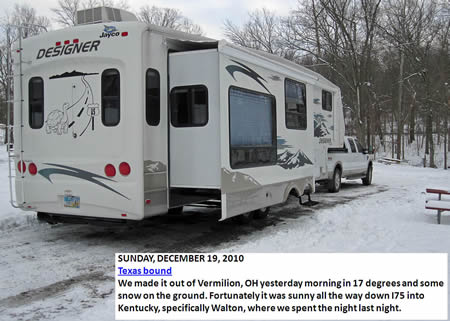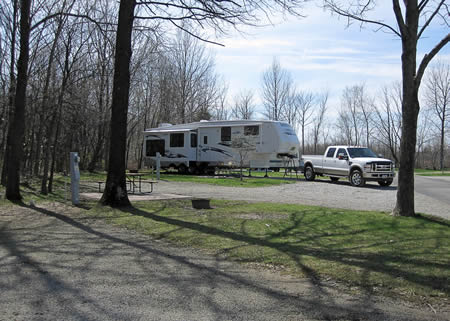The following is a timeline of how Dave and I made a decision to become an RVer, how we moved from the working world to retired life, and what prompted us to do this. The decision to become an RVer did not happen overnight. We had been sailors on Lake Erie for many years and even had joined our friends sailing on their boat on the Chesapeake Bay. When we were not sailing, we were tent camping at some campground not far from our home. Then reality hit. With grandchildren being born, we realized that being on-board the boat would not be practical for visits with Grandpa and Grandma. So, next logical step was to become a ‘land-sailor’ - moving around on land in a recreational vehicle (RV) of some sort. We were getting older and tent camping did not hold a warm and fuzzy feeling for us, the ground was getting harder and harder! We went to many RV shows, talking to dealers and sitting and dreaming - was this the RV we are looking for, weeding out what we liked and didn’t like. Would we be more comfortable in a Class A Motor-home (big bus-like vehicle where you tow a car behind), a Class C (much smaller than an A but still all inclusive like a C and still tow a vehicle behind), choose a 5th Wheel which is the type of RV where it is hitched up into the bed of a truck and the truck pulls the 5th wheel. Or should we get a Class B which is a large van that has sleeping quarters and cooking on a very small scale? Or last, get a travel-trailer which is a box-type RV where it is pulled by a van or truck, hitched up at the bumper instead of inside the bed of the truck. But first, we had to stop working. We wanted to go for extended times out on the road and working at the same time just wasn’t feasible. After tweaking our plans on when to do this, stop working, and finding the right RV (a 5th wheel - based on our personal preferences and needs) plus getting a truck to haul it - we began our adventure in 2009.
We had been weekend campers for many years, not RVers. What’s the difference? Weekend campers do not go far from their home, only come out on the weekends, have a smelly campfire, and typically are trying to get the most out of their weekends and therefore don’t often follow the courtesy rules of RV life. Most weekenders have travel-trailer boxes, tenting, or small pop-up tent trailers. You’ll rarely see a Class A or C. That was the two of us - getting the most bang for our buck on limited time in a tent. We were noisy, not friendly to others because we didn’t have time. We rarely paid attention to our environment. RVers are folks that rarely have campfires, are very conscientious of others, will strike up conversations with total strangers, and leave only footprints behind. RVers usually are retired so there is no pressure of time commitments, their lifestyle is written in Jello - shake it up and new plans are molded. There are two types of RVers. Full-timers do not have a sticks-and-bricks type home anymore and live full time in their RV, moving about the country, sightseeing, and carrying all their possessions in their RV. Extended RVers are those people who may still own a home, or another RV that is permanently set up at a campground, and travel for periods of time during the year. We started out as extended RVers, moved to being full-timers, to now back to being extended RVers. We have a permanent RV located in Picacho, Arizona for the winter months and travel the other 6 to 7 months around the country in our 5th wheel/diesel truck.
We travel with our cat Grace, and try to see what we can in a 100-mile radius from where we are currently camping. Sometimes we stay in one place for weeks and then on other occasions we are there only a couple of days, using it as a rest stop as we move towards a chosen location. We rarely eat out; I cook most meals in the kitchen, have a 12 cubic foot refrigerator/freezer for our food, but depend on the campgrounds we visit for laundry facilities. We have recliner chairs to relax in after long days of hiking or sightseeing, our own shower and toilet facility inside the RV and best of all, our own bed. Prices vary for rental fees of a space but by joining camping clubs we are able to keep costs at a minimum. Our biggest cost is the diesel fuel. What a great way to see this big beautiful country!
Editor: You can follow Linda and Dave’s RV adventures at their blog below. http://lvngrdream.blogspot.com/
|


